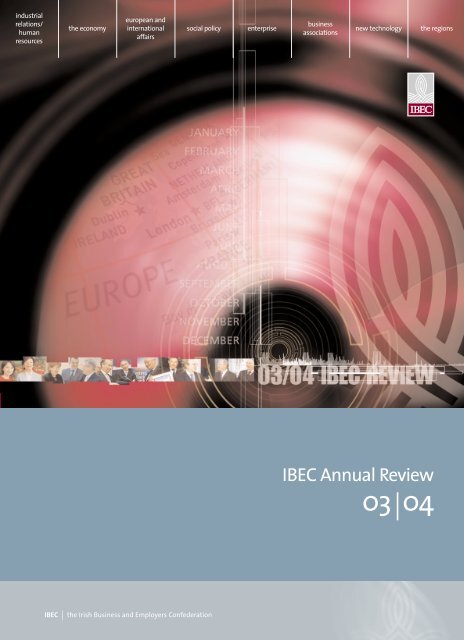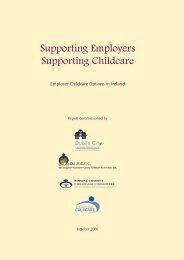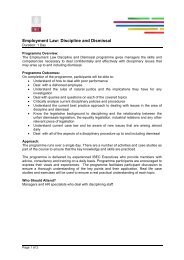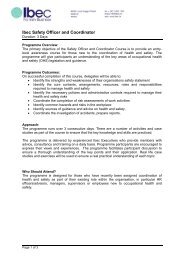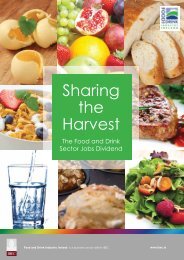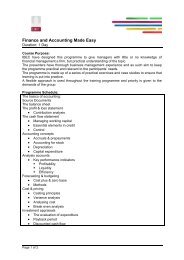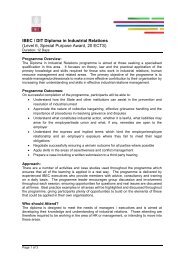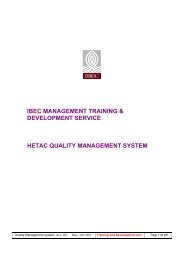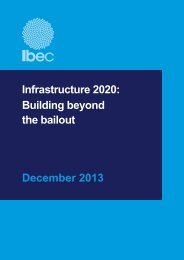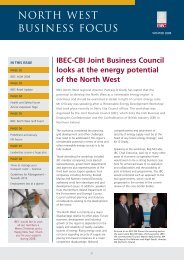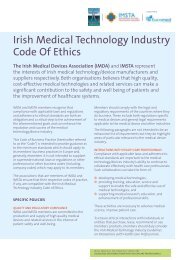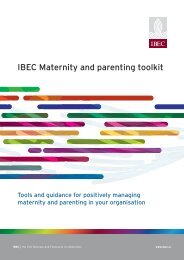IBEC Annual Review - Irish Business and employers confederation
IBEC Annual Review - Irish Business and employers confederation
IBEC Annual Review - Irish Business and employers confederation
Create successful ePaper yourself
Turn your PDF publications into a flip-book with our unique Google optimized e-Paper software.
industrial<br />
relations/<br />
human<br />
resources<br />
the economy<br />
european <strong>and</strong><br />
international<br />
affairs<br />
social policy<br />
enterprise<br />
business<br />
associations<br />
new technology<br />
the regions<br />
<strong>IBEC</strong> <strong>Annual</strong> <strong>Review</strong><br />
03 04<br />
<strong>IBEC</strong> | the <strong>Irish</strong> <strong>Business</strong> <strong>and</strong> Employers Confederation
industrial<br />
relations/<br />
human<br />
resources<br />
the economy<br />
european <strong>and</strong><br />
international<br />
affairs<br />
social policy<br />
enterprise<br />
business<br />
associations<br />
new technology<br />
the regions<br />
2 4 6 8 10 12 14 16<br />
Mission Statement <strong>IBEC</strong> will vigorously promote<br />
the interests of <strong>Irish</strong> business <strong>and</strong> <strong>employers</strong> by working<br />
to create <strong>and</strong> sustain a competitive business environment<br />
that encourages enterprise <strong>and</strong> growth.<br />
As the recognised independent voice of business, <strong>IBEC</strong> is<br />
dedicated to meeting member needs by providing<br />
leadership <strong>and</strong> excellent services through its team of<br />
professional <strong>and</strong> committed staff.
president’s<br />
message<br />
<strong>IBEC</strong> <strong>Annual</strong> <strong>Review</strong> 03 04<br />
The second year of my term of office has been a<br />
time both of radical change <strong>and</strong> of sober<br />
consolidation. My presidency closes with what is<br />
probably the most significant event in Europe for<br />
decades – perhaps even centuries: the accession<br />
of ten new member states to the European<br />
Union. On the domestic level, <strong>Irish</strong> business<br />
continues to concentrate its efforts on survival in<br />
the face of pervasive, unnecessary regulation, cutthroat<br />
global competition, <strong>and</strong> rising input costs.<br />
EU Enlargement coincided with the <strong>Irish</strong><br />
presidency of the Union. I was delighted to work<br />
with Mr Jacques Schraven, president of the Dutch<br />
business federation, VNO-NCW, <strong>and</strong> with our<br />
partners in the European business body, UNICE, to<br />
ensure that the Lisbon Strategy found its proper<br />
place in the European presidency’s agenda. Far<br />
too much remains to be done to achieve the<br />
Lisbon goal of ‘making Europe the most<br />
competitive <strong>and</strong> knowledge-based economy in<br />
the world’ by 2010, but I am confident that, with<br />
tenacity <strong>and</strong> hard work, European business can<br />
persuade governments of the necessity for a<br />
sound, dynamic, flourishing trading environment.<br />
Nowhere is this need more evident than in the<br />
glut of regulation, both national <strong>and</strong> European,<br />
that constricts business. All too often, regulation<br />
is imposed in response to single issue dem<strong>and</strong>s,<br />
to solve a single perceived problem, with little<br />
sense of perspective <strong>and</strong> taking little account of<br />
its effects on other areas of either social or<br />
commercial life. The fact is that over-regulation is<br />
costing jobs, cramping the start-up of new<br />
businesses, imposing unmanageable levels of<br />
bureaucracy, damaging competitiveness,<br />
sometimes irreparably – <strong>and</strong> probably not always<br />
achieving the purpose for which it was imposed.<br />
The business answer is simple: count the cost, as<br />
well as the benefit.<br />
Counting the cost is something <strong>Irish</strong> companies<br />
have learned to do very well. Irel<strong>and</strong> can be a very<br />
expensive place in which to do business - the<br />
various reports in this review all give evidence of<br />
that – <strong>and</strong>, although insurance costs have<br />
moderated <strong>and</strong> the rate of inflation has decreased<br />
to manageable proportions, our input costs are still<br />
such as to enable our competitors to undercut us<br />
on the world markets on which we trade.<br />
The cost of pay is one of those input costs over<br />
which we can exercise control. The first part of<br />
Sustaining Progress was front-loaded in an effort<br />
to alleviate for employees the strain of high<br />
inflation (although business was the first to suffer<br />
from this). The second round must be more<br />
realistic: with competition from the Far East <strong>and</strong><br />
from the lower-cost accession countries, <strong>Irish</strong><br />
enterprises will need to be leaner <strong>and</strong> more<br />
dynamic than ever. This is something for which<br />
everyone must take responsibility - government,<br />
<strong>employers</strong> <strong>and</strong> employees – because everyone will<br />
suffer if we fail in this.<br />
As this is my last annual review as your President,<br />
I would like to pay tribute to the entire team at<br />
<strong>IBEC</strong>, so capably led by our Director General,<br />
Turlough O’Sullivan. I have had the opportunity to<br />
work particularly closely with Turlough in the past<br />
two years, <strong>and</strong> to witness at first h<strong>and</strong> from the<br />
many meetings we attended around the country,<br />
the respect <strong>and</strong> regard in which he is held by<br />
colleagues, members, civil servants <strong>and</strong> the<br />
government. He is an articulate <strong>and</strong> skilful<br />
advocate of our views, <strong>and</strong> he always placed the<br />
best interests of member companies at the centre<br />
of his actions. I am grateful to Turlough <strong>and</strong><br />
everybody in the organisation for the support,<br />
help, <strong>and</strong> guidance they offered me at all times<br />
during my term in office.<br />
Maurice Pratt<br />
1
industrial<br />
relations/<br />
human<br />
resources<br />
the economy<br />
european <strong>and</strong><br />
international<br />
affairs<br />
social policy<br />
enterprise<br />
business<br />
associations<br />
new technology<br />
the regions<br />
Compared with previous years, 2003 was a less turbulent time for <strong>Irish</strong><br />
industrial relations. The first phase of Sustaining Progress worked well. High<br />
compliance with its terms provided a stable industrial climate. Fewer days were<br />
lost to industrial disputes, particularly in the private sector. Although non-pay<br />
business costs were rising rapidly, productivity levels held up.<br />
According to feedback from <strong>IBEC</strong> members, the overall experience of<br />
Sustaining Progress was positive. The new ‘assessment’ process agreed<br />
by the social partners was much more successful than in other years. No<br />
claims went to the Labour Court: they were all settled either at local or<br />
assessor level.<br />
The Performance Verification Groups established under Sustaining<br />
Progress completed their work concerning benchmarking payments due<br />
on 1 January 2004. <strong>IBEC</strong> worked through the National Implementation<br />
Body to ensure that the performance verification terms operated as<br />
intended: to implement the delivery of real <strong>and</strong> effective change in<br />
modernisation <strong>and</strong> flexibility across the public service.<br />
<strong>IBEC</strong> director Brendan<br />
McGinty at the<br />
launch of the Equality<br />
Authority’s video,<br />
‘Quality through<br />
Equality – how to<br />
build an equality<br />
infrastructure in the<br />
workplace’.<br />
In the public sector, difficulties arose in 2003 with both the ASTI<br />
directive to members not to teach the new syllabus at second level, <strong>and</strong><br />
with the INTO threat of industrial action over the level of funding for<br />
building improvements. Both unions deferred their action. The<br />
implementation of benchmarking awards to teachers was delayed<br />
beyond 1 January until agreement was reached on the st<strong>and</strong>ardisation<br />
of the school year.<br />
Discussions on phase two of the national pay deal under Sustaining<br />
Progress began. In the run up to these discussions, the Confederation<br />
consulted its members through a series of well-attended meetings.<br />
<strong>Business</strong> established a strong consensus. Irel<strong>and</strong> had lost its competitive<br />
edge. Producers could not continue to price themselves out of the<br />
world market. Future wage increases had to be in line with our trading<br />
partners.<br />
Redundancies in the private sector rose to worrying levels as companies<br />
strove to hold their place in increasingly competitive markets. There<br />
were over 27,700 redundancies in the private sector. Many of these jobs<br />
were lost in the high tech, high value-added sectors of the economy.<br />
Manufacturing firms were again particularly badly hit. Their biggest<br />
threat came from Eastern Europe, the Far East, <strong>and</strong> China.<br />
2<br />
Two substantial pieces of employment legislation were signed into law:<br />
the Redundancy Payments Act <strong>and</strong> the Industrial Relations Act.
<strong>IBEC</strong> <strong>Annual</strong> <strong>Review</strong> 03 04<br />
industrial<br />
relations/<br />
human<br />
resources<br />
At the HR Summit in November 2003 were (l-r):<br />
RTE’s Bryan Dobson, who chaired the conference;<br />
An Tánaiste Mary Harney TD, the keynote speaker;<br />
<strong>and</strong> <strong>IBEC</strong> director Brendan McGinty.<br />
An enhanced code of practice on voluntary<br />
dispute resolution <strong>and</strong> a new code on victimisation<br />
were finalised. This legislation arose out of<br />
commitments in Sustaining Progress between<br />
the social partners to effect dispute resolution<br />
procedures where collective bargaining<br />
arrangements were not in place. Agreements on<br />
voluntary codes of practice for dispute resolution<br />
in essential service provision were finalised in the<br />
health <strong>and</strong> local government sectors. <strong>IBEC</strong><br />
welcomed the codes, but believed more needed<br />
to be done to give them legal effect. Unions’<br />
threatened disruption to transport services early<br />
in 2004 highlighted this need.<br />
<strong>IBEC</strong>’s IR/HR team continued to provide<br />
representation for individual companies at the<br />
Labour Relations Commission, the Labour Court<br />
<strong>and</strong> the Employment Appeals Tribunal.<br />
During the year, <strong>IBEC</strong> delivered a varied <strong>and</strong><br />
extensive schedule of programmes. Over 300<br />
delegates attended the HR Summit, HR: Ignite<br />
the Passion, which attracted prominent<br />
contributors from home <strong>and</strong> abroad. <strong>IBEC</strong> joined<br />
the National College of Irel<strong>and</strong> to present a<br />
successful series of lunchtime lectures. In<br />
addition, the Confederation’s management<br />
training service provided comprehensive <strong>and</strong><br />
popular training programmes. Following<br />
member requests for information <strong>and</strong> best<br />
practice examples in core HR areas, a series of<br />
workshops was organised. The<br />
Confederation’s submission on the<br />
‘Workplace of the Future’,<br />
presented early in 2004, was<br />
rooted in <strong>IBEC</strong>’s business vision,<br />
which saw Irel<strong>and</strong> as one of the<br />
most competitive economies<br />
in the world by 2012.<br />
<strong>IBEC</strong>’s <strong>Irish</strong> Profit Sharing Association had a busy<br />
year. It held its annual awards <strong>and</strong> dinner in<br />
June. Despite stock market declines, the level of<br />
employee share ownership in Irel<strong>and</strong> was<br />
expected to continue to exp<strong>and</strong>. Member<br />
briefings <strong>and</strong> workshops were held around the<br />
country.<br />
<strong>IBEC</strong> completed its 2003 national survey on<br />
rates of pay <strong>and</strong> conditions of employment. The<br />
survey looked at the manufacturing <strong>and</strong> wholesale<br />
distribution sector. It provided an overall<br />
statistical analysis of basic pay rates for each<br />
category of employee. A total of 473 companies<br />
responded, employing over 70,930 employees<br />
nationally. The survey analysed over 50<br />
categories of employee, by size of company,<br />
industry <strong>and</strong> region. The results are available<br />
only to survey participants.<br />
The National Partnership Training Skillnet, an<br />
<strong>IBEC</strong>/ICTU initiative supported by Skillnets, organised<br />
a conference in January to explore alternative<br />
dispute resolution (ADR) mechanisms <strong>and</strong> their links<br />
with industrial relations. Pictured at the conference<br />
were (l-r): Professor Paul Teague, Queen’s University,<br />
Belfast; Bryan Dobson, RTE, who chaired the<br />
conference; Maureen Brogan, National Partnership<br />
Training Skillnet; Fergus Whelan, ICTU; <strong>and</strong> Liam<br />
Doherty, <strong>IBEC</strong>.<br />
At a series of lunchtime lectures in the National<br />
College of Irel<strong>and</strong> (NCI) were (l-r): Joyce O’Connor,<br />
NCI; Brendan McGinty, <strong>IBEC</strong>; <strong>and</strong> EU Commissioner<br />
David Byrne.<br />
3
industrial<br />
relations/<br />
human<br />
resources<br />
the economy<br />
european <strong>and</strong><br />
international<br />
affairs<br />
social policy<br />
enterprise<br />
business<br />
associations<br />
new technology<br />
the regions<br />
The global economy turned around in the course of 2003,<br />
as the world moved out of the slowdown that had characterised the preceding<br />
two years. The pattern of recovery was by no means evenly distributed, with the<br />
euro area economy seriously lagging behind the rest of the world. World GDP<br />
growth showed a significant acceleration in the second half of 2003, providing a<br />
firm platform for growth in 2004. The European Commission estimates that<br />
world GDP growth was 3.7%, following a growth of 2.7% in 2002.<br />
The regional distribution of growth in 2003 widened, with stronger<br />
than expected contributions coming from the US (3.1%), CIS countries<br />
(7.5%), OPEC (7.3%) <strong>and</strong> Asia (6.2%). By contrast, the euro area<br />
managed to achieve a growth of only 0.4%. Strong US growth was<br />
helped by accommodating monetary policy with interest rates of only<br />
1%, a fiscal boost from expenditure increases <strong>and</strong> tax reductions, <strong>and</strong><br />
dollar weakness. One of the features of global economic developments<br />
in 2003 was the 30% contribution of China to the growth in world<br />
imports - a positive spin-off for the Japanese economy, which grew by<br />
2.7% following two years of stagnation.<br />
At the launch of<br />
<strong>IBEC</strong>’s budget<br />
submission in<br />
September 2003<br />
were (l-r): <strong>IBEC</strong><br />
director Brian<br />
Geoghegan; <strong>IBEC</strong><br />
director general<br />
Turlough<br />
O’Sullivan; <strong>and</strong> the<br />
chairman of <strong>IBEC</strong>’s<br />
ECOTAX<br />
Committee, John<br />
McNerney,<br />
Readymix plc.<br />
Euro area growth picked up in the second half of 2003 largely as a<br />
result of a surge in exports, while the growth contribution of domestic<br />
dem<strong>and</strong> was negligible. In particular, investment growth was negative<br />
<strong>and</strong> was barely offset by a lacklustre performance of consumer<br />
expenditure. The competitiveness of the euro area economy was not<br />
helped by the strength of the euro. The euro area bore most of the<br />
brunt of the dollar decline as so many global currencies moved in<br />
sympathy with the dollar.<br />
<strong>Irish</strong> GNP growth recovered from the 0.1% increase in 2002 to record a<br />
gain of 3.3% in 2003. Because of the timing of factor income flows<br />
associated with multinational companies, Irel<strong>and</strong>’s GDP growth at 6.9%<br />
was much higher than GNP growth in 2002, but significantly less in<br />
2003 at 1.4%. Growth in GNP accelerated in the final quarter of the<br />
year reaching 5.5%. Overall performance of many sectors of the<br />
economy was disappointing. Consumer spending grew by only 1.9%,<br />
down from 2.7% in 2002 <strong>and</strong> significantly down on the 7.9% average<br />
growth of the preceding three years. Despite a record 69,000 houses<br />
being built, investment fell by 2.9%, the first fall in investment since<br />
1993. Exports of goods <strong>and</strong> services fell by 5.6%, but this outturn was<br />
distorted by significant VAT fraud in the UK involving a carousel<br />
arrangement. But for this, there could have been a marginal growth in<br />
exports.<br />
4
the economy<br />
<strong>IBEC</strong> <strong>Annual</strong> <strong>Review</strong> 03 04<br />
<strong>IBEC</strong>’s publication, the Quarterly Economic Trends, is<br />
widely recognised as one of the most authoritative<br />
periodicals in the field. Pictured at the presentation<br />
of the ‘new look’ Trends in July 2003 were <strong>IBEC</strong><br />
director Brian Geoghegan <strong>and</strong> chief economist<br />
David Croughan, the editor of the publication.<br />
Anxious attention focused on Irel<strong>and</strong>’s declining<br />
competitiveness <strong>and</strong> on inflation, which had<br />
been significantly above the euro area average<br />
for the past three years. It fell back from 5.1%<br />
in February to 1.9% in December, averaging<br />
3.5% for the year. Much of the downward<br />
impetus came from the rise in the exchange rate<br />
of the euro against the dollar of some 40%<br />
between January 2002 <strong>and</strong> the end of 2003.<br />
Against sterling, the euro rose by almost 15% in<br />
the same period.<br />
However, while inflation fell rapidly in the traded<br />
goods sector, there was a much slower response<br />
in the service sector where the high pay increases<br />
in recent years, in excess of the pay agreements,<br />
<strong>and</strong> a lack of competition, especially in<br />
administered services served to keep inflation<br />
high. <strong>IBEC</strong> campaigned vigorously throughout<br />
the year, drawing attention to the gulf between<br />
inflation in the traded sectors of the economy<br />
<strong>and</strong> the much higher rate in sheltered sectors.<br />
Significant further progress was made in the first<br />
quarter of 2003 <strong>and</strong> inflation fell to 1.3%. On<br />
an EU harmonised basis <strong>Irish</strong> inflation was 1.8%<br />
in March 2003, no longer an outlier in the euro<br />
area where inflation was 1.7%.<br />
GDP – Real Percentage Change, 2001-2005<br />
01 02 03e 04f 05f<br />
Irel<strong>and</strong> 6.2 6.9 1.2 3.7 4.6<br />
Germany 0.8 0.2 -0.1 1.5 1.8<br />
France 2.1 1.2 0.2 1.7 2.4<br />
UK 2.1 1.6 2.2 3.0 2.8<br />
US 0.5 2.2 3.1 4.2 3.2<br />
Euro area 1.6 0.9 0.4 1.7 2.3<br />
EU-15 1.7 1.1 0.8 2.0 2.4<br />
Consumer Prices – Harmonised Index, Percentage Change, 2001-2005<br />
01 02 03e 04f 05f<br />
Irel<strong>and</strong> 4.0 4.7 4.0 2.1 2.3<br />
Germany 1.9 1.3 1.0 1.3 1.1<br />
France 1.8 1.9 2.2 1.9 1.5<br />
UK 1.2 1.3 1.4 1.6 1.9<br />
US 2.8 1.6 2.3 1.4 1.2<br />
Euro area 2.4 2.3 2.1 1.8 1.6<br />
EU-15 2.2 2.1 2.0 1.8 1.7<br />
At the presentation of its<br />
Quarterly Economic Trends in<br />
late March 2004, <strong>IBEC</strong> set the<br />
scene for the second phase of<br />
the pay talks in the national<br />
agreement, Sustaining<br />
Progress. Pictured at the press<br />
conference were (l-r): chief<br />
economist David Croughan;<br />
director Brian Geoghegan;<br />
<strong>and</strong> director general Turlough<br />
O’Sullivan.<br />
Employment – Percentage Change, 2001-2005<br />
01 02 03e 04f 05f<br />
Irel<strong>and</strong> 3.0 1.3 1.8 0.8 1.3<br />
Germany 0.4 -0.6 -1.1 -0.1 0.7<br />
France 1.8 0.7 0.0 0.1 0.7<br />
UK 0.7 0.7 0.9 0.4 0.3<br />
US -0.3 -0.3 0.9 0.9 0.6<br />
Euro area 1.4 0.6 0.0 0.3 0.9<br />
EU-15 1.3 0.6 0.1 0.3 0.8<br />
5
industrial<br />
relations/<br />
human<br />
resources<br />
the economy<br />
european <strong>and</strong><br />
international<br />
affairs<br />
social policy<br />
enterprise<br />
business<br />
associations<br />
new technology<br />
the regions<br />
The past year dem<strong>and</strong>ed an intense level of activity, offering little respite<br />
between <strong>IBEC</strong>’s Nice Treaty referendum campaigns of 2001/2 <strong>and</strong> the <strong>Irish</strong> EU<br />
Presidency in 2004. In particular, the presentation of a draft EU Constitution, <strong>and</strong><br />
the start – <strong>and</strong> end – of the international trade talks in Cancún, served once<br />
again as a reminder that Irel<strong>and</strong> needs to be particularly conscious of the<br />
international context in which its open economy operates.<br />
At the EU President’s<br />
meeting in Brussels<br />
in February 2004<br />
were (l-r): Anne<br />
Anderson,<br />
Permanent<br />
Representative to<br />
the EU; <strong>IBEC</strong> director<br />
Maria Cronin; <strong>IBEC</strong><br />
president Maurice<br />
Pratt; <strong>and</strong> <strong>IBEC</strong><br />
director general<br />
Turlough O’Sullivan.<br />
Promoting actions at national <strong>and</strong> European level on the Lisbon<br />
Strategy constituted a major priority for <strong>IBEC</strong> throughout the year. At a<br />
meeting of the EU Tripartite Social Summit on the eve of the Spring<br />
Summit in March 2003, <strong>IBEC</strong>’s director general Turlough O’Sullivan<br />
presented the Confederation’s position paper, ‘Competitiveness Issues<br />
for <strong>Irish</strong> <strong>Business</strong> within Europe’, to the prime ministers of Greece, Italy<br />
<strong>and</strong> Irel<strong>and</strong>. A further <strong>IBEC</strong> report, in advance of the 2004 Spring<br />
Summit, was prepared by the EU Policy Committee during the<br />
Christmas period, <strong>and</strong> h<strong>and</strong>ed to the Taoiseach after its approval by the<br />
National Executive Council.<br />
Of central importance during the year were the preparations for the<br />
January-June 2004 <strong>Irish</strong> Presidency of the European Union. <strong>IBEC</strong> <strong>and</strong> its<br />
Dutch counterpart, the VNO-NCW, presented the business priorities for<br />
the presidency in a joint submission to both the <strong>Irish</strong> <strong>and</strong> the Dutch<br />
governments. The outcome of this co-operative venture was that the<br />
specific priorities articulated by business became the central focus of<br />
the <strong>Irish</strong>/Dutch presidency programme, launched in December 2003.<br />
<strong>IBEC</strong>’s contribution to the work of UNICE, the European business <strong>and</strong><br />
<strong>employers</strong> body, increased steadily over the year, as we prepared for<br />
our role as ‘presidency federation’ in 2004. The highlight of this will be<br />
<strong>IBEC</strong>’s hosting of UNICE’s ‘Council of Presidents’ programme in June<br />
2004, a major event that will showcase <strong>IBEC</strong> with our partner<br />
federations from 29 European countries.<br />
Work on specific advocacy actions was also of key importance to the<br />
work of the Brussels office. In particular, the office has been very active<br />
in <strong>IBEC</strong>’s advocacy on the future chemicals regulation (REACH) at EU<br />
level. <strong>IBEC</strong> is working with the overall industry lobby, including UNICE<br />
<strong>and</strong> the European Chemical Manufacturers Federation (CEFIC), to<br />
ensure a more workable system for the monitoring <strong>and</strong> control of<br />
chemical substances <strong>and</strong> the protection of the competitiveness of<br />
European industry.<br />
6
european <strong>and</strong><br />
international<br />
affairs<br />
<strong>IBEC</strong> <strong>Annual</strong> <strong>Review</strong> 03 04<br />
<strong>Business</strong>es all over Europe are worried about the unmanageable –<br />
<strong>and</strong> increasing - level of regulation they have to service. <strong>IBEC</strong>'s<br />
main EU Presidency event, the conference entitled ‘Is regulation<br />
killing business?’, was a response to this concern. Pictured at the<br />
event were (l-r): Erkki Liikanen, EU Commissioner; <strong>IBEC</strong> president<br />
Maurice Pratt; <strong>and</strong> <strong>IBEC</strong> director general Turlough O' Sullivan.<br />
<strong>IBEC</strong> members continued to benefit from the<br />
production by the <strong>Irish</strong> <strong>Business</strong> Bureau (<strong>IBEC</strong>’s<br />
Brussels office) of EU issue trackers, which<br />
monitor developments on draft EU legislation.<br />
These covered such areas as employment <strong>and</strong><br />
social affairs; economics <strong>and</strong> taxation; environment<br />
<strong>and</strong> energy; transport; <strong>and</strong> information<br />
society. <strong>IBEC</strong>’s European Monthly Newsletter <strong>and</strong><br />
quarterly EU Update were also sent to members<br />
throughout the year. These publications,<br />
complemented by a constantly updated website<br />
– www.ibec.ie/ibb - kept <strong>IBEC</strong> members<br />
informed of key developments both at home<br />
<strong>and</strong> in Brussels. In addition, <strong>IBEC</strong>’s Brussels<br />
offices also served as the secretariat for the <strong>Irish</strong><br />
Belgian <strong>Business</strong> Association (IBBA). Through this<br />
connection, <strong>IBEC</strong> delegations were able to meet<br />
the people at the centre of activity in Brussels.<br />
<strong>IBEC</strong> was delighted to welcome EU Enlargement<br />
on 1 May. The Confederation in general, <strong>and</strong><br />
the IBB in particular, had worked consistently<br />
<strong>and</strong> extensively over the years to create good<br />
relations with the business federations in the<br />
accession countries. These efforts will continue<br />
in the decades ahead.<br />
Global trade<br />
In response to the ever-increasing dem<strong>and</strong>s of<br />
the global economy, the Confederation stepped<br />
up its activities in the area of world-wide trade.<br />
The Trade Council, comprising representatives of<br />
<strong>IBEC</strong>’s many business federations, as well as<br />
personnel from relevant government<br />
Departments, published a comprehensive<br />
position paper on Irel<strong>and</strong>’s place in global<br />
commerce. It also launched a periodical, Trade<br />
News, to cover current concerns <strong>and</strong> activities.<br />
<strong>IBEC</strong>/CBI Joint <strong>Business</strong> Council<br />
The <strong>IBEC</strong>/CBI Joint <strong>Business</strong> Council was<br />
established to sustain <strong>and</strong> develop cooperation<br />
on the isl<strong>and</strong> of Irel<strong>and</strong> <strong>and</strong> advance international<br />
competitiveness. During a busy year, the<br />
council published three reports aimed at<br />
improving the business environment. The council<br />
also published reports on promoting crossborder<br />
mobility of labour in the Interreg region<br />
<strong>and</strong> on developing education/business linkages<br />
to improve innovation <strong>and</strong> entrepreneurship.<br />
At a meeting of <strong>Irish</strong> <strong>and</strong> European business<br />
representatives in January were (l-r): Philippe de Buck,<br />
UNICE secretary general; <strong>IBEC</strong> director Maria Cronin;<br />
<strong>IBEC</strong> director general Turlough O’Sullivan; UNICE<br />
president Dr Jurgen Strube; <strong>IBEC</strong> president Maurice<br />
Pratt; <strong>and</strong> Arthur Forbes, <strong>IBEC</strong>’s <strong>Irish</strong> <strong>Business</strong> Bureau.<br />
The European Trade Commissioner Pascal Lamy visited<br />
<strong>IBEC</strong> to discuss the way forward for world trade talks<br />
following the collapse of the Cancun conference. Mr<br />
Lamy is pictured here with Ciaran Fitzgerald, <strong>IBEC</strong><br />
director with responsibility for trade (left) <strong>and</strong> with<br />
William Maher, <strong>IBEC</strong>.<br />
7
industrial<br />
relations/<br />
human<br />
resources<br />
the economy<br />
european <strong>and</strong><br />
international<br />
affairs<br />
social policy<br />
enterprise<br />
business<br />
associations<br />
new technology<br />
the regions<br />
Conscious of the social dynamic between business <strong>and</strong> the broader<br />
community, <strong>IBEC</strong> continued to offer services in the social policy area at<br />
enterprise, national <strong>and</strong> international level. <strong>IBEC</strong> activity in the area was informed<br />
by a strategic approach to developments at home <strong>and</strong> abroad, coupled with a<br />
careful <strong>and</strong> pragmatic focus on the requirements of the individual <strong>IBEC</strong> member.<br />
Legislation<br />
Of particular interest to <strong>IBEC</strong> members <strong>and</strong> officials during the year were<br />
the Protection of Employees (Fixed-term Work) Act, 2003, which<br />
prohibited discrimination against those on fixed-term contracts, <strong>and</strong> the<br />
Data Protection Amendment Act, 2003, which brought manual systems<br />
under the terms of the legislation for the first time.<br />
At a breakfast<br />
meeting organised<br />
by <strong>IBEC</strong> to give<br />
business the<br />
opportunity to<br />
discuss best practice<br />
in the area of<br />
diversity were <strong>IBEC</strong><br />
director Maria<br />
Cronin <strong>and</strong> (right)<br />
Mary Robinson,<br />
Executive Director<br />
of the UN Ethical<br />
Globalisation<br />
Initiative.<br />
Work in progress during the year included the draft Directive on Temporary<br />
Agency Work (stalled at EU level as we went to press) <strong>and</strong> the Equality Bill.<br />
In addition, the Confederation began working on the implementation of<br />
the Voluntary Agreement on Teleworking – the first agreement of its kind<br />
in Irel<strong>and</strong>. The European Working Time Directive continued to be under<br />
review by the EU Commission.<br />
<strong>IBEC</strong> responded to the government’s consultation paper on the Directive on<br />
Information <strong>and</strong> Consultation with a comprehensive position paper <strong>and</strong> a<br />
series of breakfast seminars on the Directive <strong>and</strong> its implementation.<br />
Human resources <strong>and</strong> social policy<br />
<strong>IBEC</strong>’s Human Resources <strong>and</strong> Social Policy Committee (HRSPC) set up five<br />
working groups to develop policies in relation to legislation, education/<br />
training/lifelong learning, partnership, diversity in the workplace <strong>and</strong><br />
corporate social responsibility. The committee provided essential feedback<br />
to members on specific issues in the policy area, one of its main concerns<br />
being to bring relevant matters to the attention of the wider membership.<br />
8<br />
Work through partnerships<br />
Over the years, <strong>IBEC</strong> has worked through partnerships with other<br />
organisations to develop underst<strong>and</strong>ing <strong>and</strong> tools in a number of areas:<br />
anti-racism, with participation in the third Anti-Racist Workplace Initiative<br />
<strong>and</strong> in the Interact Project, which developed tools for the integration of<br />
non-<strong>Irish</strong> nationals into the workplace. In addition, a group established<br />
under Sustaining Progress constituted an additional forum for developing a<br />
national strategy. <strong>IBEC</strong> hosted several workshops for <strong>employers</strong> on<br />
employing people with a disability, taking part in the Workway project <strong>and</strong><br />
sitting on the board of the European Year of People with Disabilities. The<br />
National Flexi-Work Partnership joined the Confederation to publish the<br />
first guideline in Irel<strong>and</strong> about the employment of older workers.
social policy<br />
<strong>IBEC</strong> <strong>Annual</strong> <strong>Review</strong> 03 04<br />
<strong>IBEC</strong>’s Export Orientation Programme (formerly the<br />
European Orientation Programme) celebrated its 20th<br />
birthday in 2003. Pictured at the party were founder<br />
member Paddy Jordan <strong>and</strong> current director of the<br />
programme, Caroline Nash.<br />
At <strong>IBEC</strong>’s work-life balance<br />
round table in November<br />
2003 were (l-r): <strong>IBEC</strong> director<br />
Maria Cronin; Robin<br />
Webster, AGE Action Irel<strong>and</strong>;<br />
<strong>and</strong> Frank Fahy, Minister of<br />
State with responsibility for<br />
labour affairs. The focus of<br />
the conference was on<br />
employing older workers.<br />
The Confederation was closely involved with the<br />
childcare group established under Sustaining<br />
Progress to develop childcare options for parents<br />
working outside the home.<br />
Equality<br />
The equality unit provided advice to members on<br />
all aspects of employment equality legislation<br />
<strong>and</strong> successfully represented members in<br />
numerous cases during the year.<br />
The unit trained over 700 managers on<br />
preventing <strong>and</strong> dealing with bullying <strong>and</strong><br />
harassment at work <strong>and</strong> ran training seminars<br />
on the Employment Equality Act for several<br />
hundred managers during the year.<br />
The unit made submissions to the Department of<br />
Justice, Equality <strong>and</strong> Law Reform on proposed<br />
amendments to the Employment Equality Act<br />
<strong>and</strong> was also involved in discussions on<br />
developing a Code of Practice on Parental Leave<br />
<strong>and</strong> Force Majeure Leave <strong>and</strong> on tackling the<br />
male/female wage differential.<br />
Education<br />
<strong>IBEC</strong> played a significant part in developing the<br />
National Framework of Qualifications, which<br />
was officially launched in October 2003 by the<br />
National Qualifications Authority of Irel<strong>and</strong>.<br />
The Export Orientation Programme, <strong>IBEC</strong>’s<br />
marketing graduate placement programme,<br />
went from strength to strength over the year,<br />
with nearly a thous<strong>and</strong> applicants to work<br />
abroad with the sponsoring companies.<br />
Occupational health <strong>and</strong> safety<br />
<strong>IBEC</strong> continued to press for measures to reform<br />
the compensation culture, <strong>and</strong> to alleviate the<br />
high insurance costs to which it gives rise. This<br />
activity contributed to the enactment of the<br />
Personal Injury Assessment Board <strong>and</strong> to the<br />
publication of the Civil Liability <strong>and</strong> Courts Bill.<br />
In addition, the Confederation negotiated a<br />
code on communications between insurers <strong>and</strong><br />
policyholders for proper consultation on the<br />
h<strong>and</strong>ling of personal injury claims.<br />
<strong>IBEC</strong> members benefited from the training<br />
courses in occupational health <strong>and</strong> safety, from<br />
the regular publications <strong>and</strong> from the safety<br />
audits provided by the Confederation’s OHS<br />
experts.<br />
Legal service<br />
The Confederation’s solicitors were kept busy<br />
during the year, representing member<br />
companies (with considerable success) at<br />
employment tribunals <strong>and</strong> in the Labour Court.<br />
Members benefited from the unit’s contribution<br />
to <strong>IBEC</strong>’s suite of training programmes on the<br />
complex issue of employment law. Colleagues<br />
valued the expert advice they received on the<br />
day-to-day problems their members<br />
encountered.<br />
At the launch of a major initiative for dealing with injured employees<br />
were Dorothea Dowling, Chairperson of the MIAB <strong>and</strong> Chairperson of<br />
the Interim PIAB with Tony Briscoe, <strong>IBEC</strong>. The initiative is supported by<br />
<strong>IBEC</strong> <strong>and</strong> ICTU <strong>and</strong> sets out to provide assistance <strong>and</strong> rehabilitation as<br />
well as meeting immediate medical needs <strong>and</strong> costs arising from<br />
workplace accidents.<br />
9
industrial<br />
relations/<br />
human<br />
resources<br />
the economy<br />
european <strong>and</strong><br />
international<br />
affairs<br />
social policy<br />
enterprise<br />
business<br />
associations<br />
new technology<br />
the regions<br />
Environment. Transport. Waste disposal. Energy. Law.<br />
Climate change. All of these affect business. Consequently, all are of<br />
immediate interest to <strong>IBEC</strong> <strong>and</strong> its members. This was amply demonstrated in the<br />
Confederation's submission to the Enterprise Strategy Group, which was<br />
established by the Tánaiste to chart Irel<strong>and</strong>'s enterprise strategy over the next<br />
decade. This comprehensive submission, presented in October 2003, stressed<br />
that future success dem<strong>and</strong>ed new thinking, new criteria <strong>and</strong> a new set of goals<br />
to achieve the world class business environment that Irel<strong>and</strong> needs.<br />
Environment<br />
<strong>IBEC</strong> surveys during the year showed significant increases in environmental<br />
costs: waste management, water, rates, planning <strong>and</strong> development levies.<br />
These added to the already considerable pressures on business <strong>and</strong>, in<br />
response, the Confederation called for a fundamental review of local<br />
government charges. Waste management in particular was well below<br />
what was required for a modern economy. The lack of progress in this<br />
area has resulted in the highest waste charges in Europe – <strong>and</strong> the lowest<br />
level of infrastructure.<br />
Pictured at <strong>IBEC</strong>'s<br />
TENS (Trans<br />
European Networks)<br />
conference in<br />
Dublin were (l-r):<br />
Tom Noonan,<br />
Chairman, <strong>IBEC</strong><br />
Transport <strong>and</strong><br />
Logistics Council;<br />
guest speaker, Iain<br />
Docherty, University<br />
of Glasgow; <strong>and</strong><br />
<strong>IBEC</strong> director<br />
Brendan Butler. The<br />
conference focused<br />
on the €600 billion<br />
TENS Transport<br />
investment<br />
programme <strong>and</strong><br />
called for increased<br />
competition in the<br />
<strong>Irish</strong> transport<br />
market.<br />
<strong>IBEC</strong>’s Environment Policy Committee developed a major policy paper,<br />
entitled ‘<strong>Business</strong> <strong>and</strong> the environment – striking the right balance’, which<br />
set out six fundamental principles designed to furnish a coherent <strong>and</strong><br />
consistent checklist for business <strong>and</strong> policy-makers alike. In addition, the<br />
committee established a steering group to investigate the possibility of<br />
setting up a collective compliance scheme with the WEEE Directive, due to<br />
come on stream in 2005.<br />
Other areas of interest to the committee were IPPC licensing; the<br />
Packaging Directive <strong>and</strong> Repak; planning <strong>and</strong> development levies; environmental<br />
liability; the National Spatial Strategy. The committee held a CEO<br />
forum in late November, which enabled over fifty CEOs to question the<br />
Minister for the Environment on issues of interest to a range of businesses.<br />
Energy<br />
<strong>IBEC</strong>’s Energy Policy Committee (EPC) was seriously concerned that the<br />
current model of liberalisation was not working: it had not delivered true<br />
competitive pressures <strong>and</strong>, in addition, there had been only limited entry<br />
by private investors into the power generation <strong>and</strong> energy supply sectors.<br />
Costs, of course, were on everyone’s mind: a cumulative increase in energy<br />
prices of nearly 24% over the period 2001 – 2003 exerted enormous<br />
competitive pressures on business. The committee’s policy paper entitled<br />
‘The need for a national energy policy’, spelled out business concerns on<br />
the issue.<br />
10<br />
The committee worked with the <strong>IBEC</strong>/CBI Joint <strong>Business</strong> Council to<br />
produce a business statement on the creation of an all-isl<strong>and</strong> energy<br />
market, which could deliver benefits for customers in both markets.
enterprise<br />
<strong>IBEC</strong> <strong>Annual</strong> <strong>Review</strong> 03 04<br />
At a briefing on pensions for <strong>IBEC</strong> members were<br />
(l-r): Philip Dalton, The Pension Board; Murrough<br />
O’Brien, Marsh Irel<strong>and</strong> Employee Benefit Services;<br />
<strong>and</strong> <strong>IBEC</strong>’s Marie Daly.<br />
At <strong>IBEC</strong>’s Environmental<br />
Awards 2003/2004 were<br />
(l-r): Gabriel McArdle,<br />
Kingspan GSP, overall<br />
winners; David Manning,<br />
<strong>IBEC</strong>; Ciaran McCabe,<br />
Cognis Irel<strong>and</strong> Ltd; Seamus<br />
Gethins, Klinge Pharma.<br />
The awards showcase<br />
environmental excellence<br />
in <strong>Irish</strong> business.<br />
The EPC also made submissions to the<br />
Commission for Energy Regulation (CER) on its<br />
proposals regarding new market arrangements in<br />
the electricity market <strong>and</strong> on its review of natural<br />
gas transmission <strong>and</strong> distribution tariffs. The<br />
Confederation was relieved that its representations<br />
resulted in a reduction of 3.2% on the<br />
proposed rate of increase in the gas transmission<br />
tariffs, set from 2003 to 2007.<br />
Climate change<br />
The Climate Change Working Group, with<br />
comprehensive input from both the environment<br />
<strong>and</strong> the energy policy committees, focused its<br />
efforts on such issues as carbon/energy tax,<br />
emissions trading, <strong>and</strong> negotiated agreements.<br />
<strong>IBEC</strong> vigorously opposed the introduction of a<br />
carbon energy tax, on the grounds of its adverse<br />
impact on competitiveness. The introduction has<br />
now been delayed <strong>and</strong>, since 2002, has saved<br />
industry in the region of €500 million per annum.<br />
In addition, the government announced that<br />
companies that fell under the scope of the EU<br />
Directive on Emissions Trading would not be<br />
subject to a national carbon energy tax. The<br />
Confederation welcomed this move. However,<br />
<strong>IBEC</strong> remained concerned regarding the impact of<br />
allocations by the EPA to individual installations<br />
covered by the emissions trading Directive in the<br />
National Allocation Plan.<br />
Also of particular concern to the group was the<br />
integration of negotiated agreements with the EU<br />
Directive establishing an EU-wide Emissions<br />
Trading Scheme. These, the group argued, should<br />
be compatible with the implemented Directive<br />
<strong>and</strong> any proposed future carbon energy tax.<br />
Transport<br />
<strong>IBEC</strong>’s Transport Policy Committee worked closely with<br />
government <strong>and</strong> EU agencies to keep members up to<br />
date with issues of concern: traffic, planning, l<strong>and</strong><br />
purchase, costs.<br />
Congestion was a widespread problem <strong>and</strong> the council<br />
was disappointed that government had not fulfilled its<br />
commitment in the Programme for Government to<br />
establish an independent traffic corps which, the<br />
council believed, would go some way to relieving the<br />
gridlock.<br />
During the year, a joint <strong>IBEC</strong>/CBI NI delegation met<br />
senior EU Commission officials to discuss the TENS<br />
investment programme for transport infrastructure. The<br />
group put a proposal to the Commission for a strategic<br />
study to review transport corridors both on <strong>and</strong> off the<br />
isl<strong>and</strong> of Irel<strong>and</strong>.<br />
<strong>Business</strong> law<br />
<strong>IBEC</strong> made a number of successful representations to<br />
government on the Companies (Auditing <strong>and</strong><br />
Accounting) Bill, 2003. Some of the most onerous<br />
proposed requirements of the director’s statement of<br />
compliance were mitigated, as were some of the audit<br />
committee proposals. In addition, clarification was<br />
given to the legal status of directors’ <strong>and</strong> officers’<br />
insurance. The Confederation particularly welcomed<br />
the announcement that the annual audit exemption<br />
threshold was to be raised to €1.5 million.<br />
<strong>IBEC</strong>s <strong>Business</strong> Law Council had been lobbying for<br />
some time for the establishment of a dedicated<br />
commercial court, which was finally announced in early<br />
January. The decision, which followed a recommendation<br />
of the Company Law <strong>Review</strong> Group on which the<br />
Confederation is represented, was welcomed by <strong>IBEC</strong>.<br />
A particular lobby this year has been the push by <strong>IBEC</strong><br />
to reduce <strong>and</strong> reform regulation. The Policy Advisory<br />
Group has spearheaded the <strong>IBEC</strong> lobby on this.<br />
11
industrial<br />
relations/<br />
human<br />
resources<br />
the economy<br />
european <strong>and</strong><br />
international<br />
affairs<br />
social policy<br />
enterprise<br />
business<br />
associations<br />
new technology<br />
the regions<br />
<strong>IBEC</strong>’s federations <strong>and</strong> associations had a mixed year.<br />
The turnaround in the global economy gave grounds for some optimism <strong>and</strong> the<br />
dramatic reduction in the rate of inflation offered a further boost for business<br />
confidence. However, inexorably rising input costs, coupled with narrowing<br />
margins, cramped competitiveness <strong>and</strong> forced too many companies trading on<br />
the open market to contract their operations <strong>and</strong> reduce their workforce.<br />
Prominent among the increasing costs were local authority charges. <strong>IBEC</strong>’s<br />
federations reported that service charges for waste water treatment, waste<br />
disposal, rates on business premises, contributed to a drop in competitiveness<br />
they – or the economy – could ill afford. The moderation in insurance<br />
prices, greeted with considerable relief by the enterprise sector, was offset<br />
by pay increases in excess of those of our competitors.<br />
As always, business responded by gritting its collective teeth <strong>and</strong> planning<br />
for the future. Recognising that Irel<strong>and</strong> will need high value-added<br />
industry to prosper, several associations stepped up their activity in relation<br />
to research <strong>and</strong> development (R & D). The <strong>Irish</strong> Engineering Enterprises<br />
Federation (ieef) called for increased government support for R & D to halt<br />
the sector’s falling levels of exports. The <strong>Irish</strong> Pharmaceutical <strong>and</strong> Chemical<br />
Manufacturers Federation (IPCMF) set up a working group to encourage R<br />
& D activity <strong>and</strong> the <strong>Irish</strong> Medical Devices Association (IMDA) held a<br />
conference, attracting speakers with first-h<strong>and</strong> experience of the issue.<br />
At the annual<br />
general meeting<br />
of the <strong>Irish</strong><br />
Pharmaceutical<br />
<strong>and</strong> Chemical<br />
Manufacturers<br />
Federation (IPCMF)<br />
were (l-r): Matt<br />
Moran, IPCMF<br />
director; Mark<br />
Glynn, IPCMF; <strong>and</strong><br />
Pat McCarthy, Leo<br />
Laboratories.<br />
Training <strong>and</strong> education, of course, went h<strong>and</strong> in h<strong>and</strong> with the intention to<br />
move up the value chain. Concerns that the Polymer Development Centre<br />
in Athlone would close permanently were allayed in the immediate term<br />
following intensive lobbying from the Plastics Industry Association (PIA).<br />
IMDA devised an innovative science programme for school children, Our<br />
Universe, <strong>and</strong> its Skillnet awarded over forty National Skills certificates.<br />
IPCMF established a modular regulatory affairs training programme, <strong>and</strong><br />
issued an information booklet on employment opportunities in the<br />
pharmachem industry. Food <strong>and</strong> Drink Industry Irel<strong>and</strong> (FDII) secured<br />
funding to run a project on food safety.<br />
<strong>IBEC</strong> federations found that conferences, seminars <strong>and</strong> briefing meetings<br />
were a good way to keep in touch with members <strong>and</strong> to gain feedback on<br />
matters of concern. ECR Irel<strong>and</strong> held the first foodservice conference,<br />
‘Meeting consumer needs out of home’. FDII’s annual conference discussed<br />
obesity <strong>and</strong> lifestyle choices – a very topical issue. EAN Irel<strong>and</strong> organised its<br />
conference on food traceability. FSI joined Finance Dublin to organise a<br />
colloquium, ‘A European vision for global financial services’.<br />
12
usinesses <strong>and</strong><br />
associations<br />
<strong>IBEC</strong> <strong>Annual</strong> <strong>Review</strong> 03 04<br />
Obesity was central to the discussions at the<br />
annual conference of <strong>IBEC</strong>’s Food <strong>and</strong> Drink<br />
Industry Irel<strong>and</strong> in March 2004. Pictured at the<br />
conference were (l-r): Paula Mee, presenter of<br />
RTE’s Health Squad programme; Barney<br />
Whelan, Food Safety Promotions Board; <strong>and</strong><br />
<strong>IBEC</strong> director Ciaran Fitzgerald.<br />
IPCMF joined FÁS <strong>and</strong> the International Society<br />
for Pharmaceutical Engineering to host a<br />
prestigious conference on good manufacturing<br />
practice (GMP) <strong>and</strong> quality control. Specialist<br />
seminars for various business sectors were well<br />
attended - the briefings for the engineering<br />
industry by ieef are examples.<br />
Regular bulletins, newsletters <strong>and</strong> ezines kept<br />
members up to date with the topics of<br />
immediate interest to their business sector. In<br />
addition, many associations published specialist<br />
books <strong>and</strong> papers. From forestry to food<br />
labelling; from mining to building materials;<br />
from responsible care in the pharmachem<br />
industry to price rises in the grocery sector: the<br />
associations ensured that their members were<br />
fully informed on the complexities of their<br />
business sector.<br />
Lobbying, of course, was the central activity for<br />
<strong>IBEC</strong>’s federations. This is not to say that <strong>IBEC</strong><br />
federations wished to exert undue pressure, but<br />
merely that members believed it was vital to<br />
ensure that both local <strong>and</strong> national government<br />
were clear on the implications for business of<br />
measures proposed by state <strong>and</strong> other agencies.<br />
Just one example was Financial Services Irel<strong>and</strong>,<br />
which lobbied successfully on the regime in<br />
relation to holding companies <strong>and</strong> on the<br />
changes relating to the financial sector in the<br />
Companies (Auditing <strong>and</strong> Accounting) Bill.<br />
Small Firms Association<br />
The Small Firms Association continued to offer<br />
small enterprises its customary high level of<br />
service <strong>and</strong> representation. Through its many<br />
surveys <strong>and</strong> publications, its meetings with state<br />
agencies at the highest level, its welcome for<br />
new ideas <strong>and</strong> new markets, the SFA ensured<br />
that the concerns of Irel<strong>and</strong>’s SMEs were kept at<br />
the top of the agenda during the year.<br />
<strong>IBEC</strong>’s <strong>Irish</strong> Clothing <strong>and</strong> Textiles Alliance sees<br />
technical textiles as a way forward for the industry in<br />
Irel<strong>and</strong>. Pictured at the conference, ‘Nanotechnology<br />
– adding value to textiles’, were (left) ICATA director<br />
Susan Doyle <strong>and</strong> (right) guest speaker Michael<br />
Janecke, Techtextil Fairs Worldwide.<br />
<strong>IBEC</strong>’s associations represent companies across<br />
the spectrum of business activity <strong>and</strong> their many<br />
activities during the year were specifically<br />
tailored to reflect their particular sector. Further<br />
information is available on <strong>IBEC</strong>’s website or on<br />
request from the relevant business association.<br />
<strong>IBEC</strong>’s <strong>Irish</strong> Dairy Industries Association hosted the 2003 European Dairy Association (EDA) general Assembly <strong>and</strong><br />
World Dairy Forum in UCC in September 2003. Pictured at the event were (l-r): <strong>IBEC</strong> director Ciaran Fitzgerald;<br />
EDA President Robert Brzusczak; Minister for Agriculture <strong>and</strong> Food Joe Walsh TD; Herman Versteijlen, Head of<br />
EU Commission Milk Division; <strong>and</strong> IDIA director Pat Ivory.<br />
13
industrial<br />
relations/<br />
human<br />
resources<br />
the economy<br />
european <strong>and</strong><br />
international<br />
affairs<br />
social policy<br />
enterprise<br />
business<br />
associations<br />
new technology<br />
the regions<br />
ICT Irel<strong>and</strong>, with its constituent associations, is now established as<br />
the representative body for the information <strong>and</strong> communications technology<br />
sector. This year, it added two new associations to the roll: the White Goods<br />
Association <strong>and</strong> the Electronics Industry Association.<br />
ICT Irel<strong>and</strong> was relieved that there were no significant changes in Budget<br />
2004 with regard to corporate tax or PRSI. The Audiovisual Federation, in<br />
particular, was pleased with the retention of the film tax incentive<br />
scheme to 2008. Through a strong, co-ordinated lobbying effort,<br />
government agreed to a tax credit of 20% to apply to incremental<br />
expenditure on R & D. The <strong>Irish</strong> Software Association successfully lobbied<br />
to extend the life of the <strong>Business</strong> Expansion <strong>and</strong> Seed Capital Schemes.<br />
ICT Irel<strong>and</strong>, in<br />
association with IEI,<br />
launched a major<br />
new jobs initiative<br />
for unemployed<br />
graduates in June<br />
2003. Pictured at<br />
the event were ICT<br />
director Brendan<br />
Butler in the<br />
foreground; the<br />
Minister for<br />
Education Noel<br />
Dempsey TD (left)<br />
<strong>and</strong> Peter Langford,<br />
president of the<br />
Institution of<br />
Engineers of<br />
Irel<strong>and</strong> (right) in<br />
the background.<br />
The activities of ICT Irel<strong>and</strong>’s associations, too numerous to list here,<br />
reflect the diverse <strong>and</strong> comprehensive makeup of the federation. The<br />
Telecommunications <strong>and</strong> Internet Federation (TIF) joined government to<br />
commit €18 million toward the roll-out of broadb<strong>and</strong> to primary <strong>and</strong><br />
secondary schools. Conferences included ‘Television in Focus’, organised<br />
by the Audiovisual Federation; a series of debates organised by the <strong>Irish</strong><br />
Software Association to cover a range of relevant topics; the launch of a<br />
project to protect mobile phones from theft, arranged by the <strong>Irish</strong><br />
Cellular Industry Association.<br />
ICT Irel<strong>and</strong> launched a Graduate Placement Programme in 2003, in which<br />
220 unemployed graduates secured placements in companies for a<br />
minimum of six months.<br />
ICT Irel<strong>and</strong> associations <strong>and</strong> working groups produced position papers on<br />
a broad spectrum of issues, from the physical infrastructure to<br />
international trade policy. ‘Getting Irel<strong>and</strong> Online’, from <strong>IBEC</strong>’s Telecoms<br />
Strategy Group, offered recommendations from all the major players in<br />
the telecoms industry in Irel<strong>and</strong>.<br />
For further details on ICT Irel<strong>and</strong> <strong>and</strong> its activities, log on to<br />
www.ictirel<strong>and</strong>.ie<br />
14
new technology<br />
<strong>IBEC</strong> <strong>Annual</strong> <strong>Review</strong> 03 04<br />
Pictured at the ICT Irel<strong>and</strong> members<br />
evening in December were (l-r): Brendan<br />
Butler, director, ICT Irel<strong>and</strong>; guest of<br />
honour Mathias Entenmann, PayPal<br />
International; <strong>and</strong> ICT chairman Jim<br />
OHara, Intel Irel<strong>and</strong> <strong>and</strong> Vice President,<br />
Technology Manufacturing Group, Intel<br />
Corporation.<br />
Pictured in October 2003 at the annual conference of<br />
<strong>IBEC</strong>’s Telecommunications <strong>and</strong> Internet Federation (TIF)<br />
were (l-r): Denis O’Brien, Communicorp; Tommy McCabe,<br />
TIF; David McRedmond, Eircom; Paul Donovan, Vodafone;<br />
<strong>and</strong> Minister for Communications, Marine <strong>and</strong> Natural<br />
Resources, Dermot Ahern TD.<br />
At an ICT Irel<strong>and</strong> briefing session in Cork, arranged in<br />
association with Cork Electronics Industry Association<br />
(CIEA) were (l-r): Brendan Butler, ICT Irel<strong>and</strong> director;<br />
CEIA chairman Sean O' Sullivan; ICT Irel<strong>and</strong> chairman<br />
Jim OHara; <strong>and</strong> Joe Gantly, Apple Irel<strong>and</strong>.<br />
<strong>IBEC</strong>’s <strong>Irish</strong> Software Association (ISA)<br />
announced the winners of the Software<br />
Industry Awards 2003 to a packed<br />
audience in Dublin. Awards went to Xsil<br />
Ltd; Am Beo Ltd; Changing Worlds; <strong>and</strong><br />
Qumas Ltd. Pictured at the event were<br />
(l-r): ISA chairman Cathal Friel; guest of<br />
honour Ms Mary Hanafin TD, Minister of<br />
State at the Department of the<br />
Taoiseach; <strong>and</strong> ISA director Kathryn<br />
Raleigh.<br />
15
industrial<br />
relations/<br />
human<br />
resources<br />
the economy<br />
european <strong>and</strong><br />
international<br />
affairs<br />
social policy<br />
enterprise<br />
business<br />
associations<br />
new technology<br />
the regions<br />
The past year has been a particularly busy one for <strong>IBEC</strong>’s Regions.<br />
As the pace of economic recovery improved, the constraints on business became<br />
more apparent.<br />
Transport <strong>and</strong> infrastructural issues were of particular importance to<br />
the regions – getting the goods to market cannot be neglected. In<br />
addition, environmental costs across the country were a growing<br />
burden on business, particularly when there was little improvement in<br />
the facilities for which the cost was levied. Specifically, the increase in<br />
local government charges – which are, in fact, stealth taxes – was an<br />
urgent issue for all regions.<br />
At a briefing on a<br />
programme of<br />
work for Cork 2005<br />
were (l-r): Julian<br />
Jackson, <strong>IBEC</strong> Cork<br />
president; Donagh<br />
Corcoran, <strong>IBEC</strong><br />
regional director,<br />
Cork; John<br />
Kennedy, director,<br />
Cork 2005; Philip<br />
MacOwen, Cork<br />
2005; <strong>and</strong> Brian<br />
Callanan, <strong>IBEC</strong><br />
director of Regions<br />
<strong>and</strong> Membership.<br />
The Regions found that dialogue was vital. With representation on<br />
decision-making bodies, <strong>and</strong> with the ability to arrange meetings<br />
between interested parties (several of the regional presidents met the<br />
board of the National Roads Authority, for example), <strong>IBEC</strong> was able in<br />
some instances to make the business case for change. The Minister for<br />
Transport, for instance, agreed to revise the completion date of the<br />
Galway to Dublin road from 2010 to 2007 after discussion with <strong>IBEC</strong><br />
West. The Cork region successfully lobbied for capital development at<br />
Cork Airport <strong>and</strong> welcomed the start of work on new facilities.<br />
Human resources, of course, was a central concern for all regions. <strong>IBEC</strong><br />
staff provided information <strong>and</strong> advice to members; they continued to<br />
represent companies at employment tribunals, at hearings <strong>and</strong> during<br />
negotiations. In addition, many regions established forums to discuss,<br />
for example, HR issues, occupational health <strong>and</strong> safety concerns,<br />
education, insurance.<br />
All regions believed that contact <strong>and</strong> consultation with members was<br />
vital. Through periodicals, through special publications, such as the Mid<br />
West Region’s publication, ‘A business perspective on the way forward<br />
for the Mid West’, through personal contact, through AGMs <strong>and</strong> ad hoc<br />
working groups: <strong>IBEC</strong> executives <strong>and</strong> <strong>IBEC</strong> members continued to build<br />
up a dynamic relationship that was the lifeblood of the business lobby.<br />
16
the regions<br />
<strong>IBEC</strong> <strong>Annual</strong> <strong>Review</strong> 03 04<br />
Pictured at the launch of a Graduate Diploma in <strong>Business</strong><br />
Studies from the Institute of Technology Sligo at <strong>IBEC</strong>’s<br />
North West 2004 AGM were (l-r): Oliver Haslette,<br />
regional president, <strong>IBEC</strong> North West; Richard Thorn,<br />
director, Institute of Technology Sligo; <strong>IBEC</strong> director<br />
general Turlough O’Sullivan; Brendan Butler, <strong>IBEC</strong>;<br />
Patricia Tomlinson, head of business department,<br />
Institute of Technology Sligo.<br />
At the forum for<br />
health <strong>and</strong> safety<br />
managers which took<br />
place in November<br />
2003 in Dublin were<br />
(l-r): <strong>IBEC</strong> regional<br />
director Adrian Beatty;<br />
Teresa Doyle <strong>and</strong><br />
Karina Cuffe, <strong>IBEC</strong>; Pat<br />
Salisbury, Fexco; <strong>and</strong><br />
Tom Beegan, Health<br />
<strong>and</strong> Safety Authority.<br />
At the regional president’s lunch in Waterford were (l-r):<br />
regional president Philip Scallan, Celtic Linen; guest<br />
speaker Michael O’Muircheartaigh; <strong>and</strong> <strong>IBEC</strong> regional<br />
director John Farrell.<br />
<strong>IBEC</strong> conducted a series of seminars on the Information<br />
<strong>and</strong> Consultation Directive. Pictured at the Galway<br />
workshop were (l-r): <strong>IBEC</strong>’s Heidi Lougheed; <strong>IBEC</strong><br />
director Brendan McGinty; <strong>IBEC</strong> West regional director<br />
John Brennan; <strong>and</strong> Orlaith Ryan, Eagle Star.<br />
17
18<br />
National Executive Council<br />
President<br />
Maurice Pratt,<br />
Group Chief Executive, Cantrell & Cochrane<br />
Group Ltd<br />
Vice-Presidents<br />
Gary McGann,<br />
Chief Executive Officer, Jefferson Smurfit Group<br />
Maurice Healy, Chief Executive Officer,<br />
Healy Chemicals Irel<strong>and</strong> Ltd<br />
Treasurer<br />
Tony O'Brien,<br />
Chairman, Cantrell & Cochrane Group Ltd<br />
Trustees<br />
Donal Byrne<br />
Chairman, Cadbury Irel<strong>and</strong> Ltd<br />
Tom Noonan<br />
Chief Executive, Maxol Group<br />
David Dilger<br />
Chief Executive, Greencore plc<br />
Breege O'Donoghue<br />
Director, Penneys Stores<br />
Regional Presidents<br />
Cork Region<br />
Julian Jackson<br />
Chairman, Southern Milling Ltd<br />
Dublin Region<br />
Tony McClafferty<br />
Operations Director, National Toll Roads Plc<br />
Kerry<br />
Gene Boyd<br />
General Manager, Fujisawa Ltd<br />
Midl<strong>and</strong>s Region<br />
Dónal Lawlor<br />
Director of International Finance <strong>and</strong><br />
Administration, Trend Technologies Ltd<br />
North East Region<br />
Seamus Lynch<br />
Manager, <strong>Irish</strong> Cement Limited<br />
North West Region<br />
Oliver Haslette<br />
Managing Director, Merenda<br />
Mid West Region<br />
Liam Ryan<br />
Managing Director, BMS (Irel<strong>and</strong>) Ltd<br />
South East Region<br />
Philip Scallan<br />
Managing Director, Celtic Linen Limited<br />
West Region<br />
Pat O’Malley<br />
Managing Director, Hollister ULC<br />
Members<br />
Gerry Andrews, Managing Director, Euroscreen Ltd.<br />
Gene Boyd, General Manager, Fujisawa Ltd<br />
Dermot Breen, Director Corporate Affairs,<br />
Tesco Irel<strong>and</strong><br />
Clive Brownlee, Assistant Managing Director,<br />
Guinness Irel<strong>and</strong> Group<br />
Michael Buckley, Group Chief Executive, AIB Group<br />
John Burke, Chief Executive, Aer Rianta<br />
Donal Byrne, Chairman, Cadbury Irel<strong>and</strong> plc<br />
Noel Cawley, Managing Director, <strong>Irish</strong> Dairy Board<br />
Damien Clancy, Managing Director,<br />
Aughinish Alumina<br />
Leo Crawford, Group Chief Executive, BWG Group<br />
Kieran Crowley, Director, Dyno-Rod<br />
John Cummins, Managing Director,<br />
Agtel Communications<br />
Frank Cunneen, Chairman, Health & Safety Authority<br />
Michael Daly, Managing Director, IBM Irel<strong>and</strong><br />
David Dilger, Chief Executive, Greencore plc<br />
Paul Duffy, General Manager,<br />
Pfizer Irel<strong>and</strong> Pharmaceuticals<br />
Paul Donovan, Chief Executive, Vodafone Irel<strong>and</strong><br />
Frank Fenn, R&A Bailey, Nangor House<br />
Cathal Friel, Director, Merrion Corporate Finance<br />
Gordon Fryett, Chief Executive, Tesco Irel<strong>and</strong> Ltd<br />
Joe Gallagher, Managing Director, Tytex Irel<strong>and</strong> Ltd<br />
Cathal Goan, Director General, RTE<br />
Danuta Gray, Chief Executive, O2 Communications<br />
Michael Grogan, Chief Executive, Roadstone Provinces<br />
Joe Harford, President/CEO,<br />
Yamanouchi Irel<strong>and</strong> Co Ltd<br />
Oliver Haslette, Managing Director, Merenda<br />
Jim Hoey, Managing Director, Masonite Irel<strong>and</strong><br />
Chris Horn, Chairman, Iona Technolgies plc<br />
Julian Jackson, Chairman, Southern Milling Ltd<br />
Bryan Jenkins, Chief Executive, Hibernian Group plc<br />
Angela Kennedy, <strong>Business</strong> Director,<br />
Megazyme International Irel<strong>and</strong><br />
Angela Kerins, Chief Executive, RehabCare<br />
Jim Killeen, Director, <strong>Irish</strong> Distillers Ltd.<br />
Donal Lawlor, Financial Director,<br />
Trend Technologies Mullingar Ltd.,<br />
Martin Lowery, Chief Executive, Coillte Teo<br />
John Lynch, Chairman, CIE<br />
Philip Lynch, Chairman, IAWS Group plc
<strong>IBEC</strong><br />
Councils<br />
<strong>IBEC</strong> <strong>Annual</strong> <strong>Review</strong> 03 04<br />
Seamus Lynch, Manager, <strong>Irish</strong> Cement Limited<br />
Declan McGrath, Managing Director, Renley Ltd<br />
John McAteer, Director of Human Resources,<br />
Abbott Irel<strong>and</strong> Ltd<br />
Domhnall MacDomhnaill, Managing Director,<br />
True Temper Ltd<br />
Pat McCann, Managing Director,<br />
Jurys Doyle Hotel Group plc<br />
Tony McClafferty, Operations Director,<br />
National Toll Roads plc<br />
Ted McGovern, Chief Executive, EBS<br />
Padraig McManus, Chief Executive, ESB<br />
John McNerney, Managing Director, Readymix plc<br />
Joe Macri, General Manager, Microsoft Irel<strong>and</strong><br />
Mary Meaney, Director,<br />
Blanchardstown Institute of Technology<br />
Kieran Miller, Managing Director,<br />
Gypsum Industries plc<br />
Shane Molloy, Chairman, Unilever Irel<strong>and</strong> plc,<br />
John Moloney, Chief Executive Officer, Glanbia<br />
Tony Murray, Managing Director, Statoil Irel<strong>and</strong><br />
Larry Murrin, Chief Executive, Dawn Farm Foods<br />
Philip Nolan, Chief Executive, Eircom<br />
Tom Noonan, Chief Executive, The Maxol Group<br />
Conor O’Brien, IPCMF<br />
Vincent O’Doherty, Director, Superquinn<br />
Breege O'Donoghue, Director, Penneys Stores<br />
Redmond O'Donoghue, Chief Executive Officer,<br />
Waterford Wedgwood plc<br />
Jim OHara, General Manager, Intel Irel<strong>and</strong> Ltd<br />
Tony O'Loghlen, Managing Dirctor Irel<strong>and</strong>,<br />
CRH Europe Materials<br />
Pat O'Malley, Plant Manager/Managing Director,<br />
Hollister ULC<br />
Billy O'Regan, Managing Director,<br />
Northern Foods<br />
David Ronayne, Director,<br />
<strong>Irish</strong> Mainport Holdings Ltd<br />
Liam Ryan, Managing Director, BMS (Irel<strong>and</strong>) Ltd<br />
Joe Ryan, Chairman, Smurfit Corrugated Irel<strong>and</strong><br />
Niall Saul, Group Head of Human Resources,<br />
<strong>Irish</strong> Life & Permanent<br />
Philippe Savinel, Managing Director,<br />
<strong>Irish</strong> Distillers Group plc<br />
Philip Scallan, Managing Director,<br />
Celtic Linen Limited<br />
Reg Shaw, Managing Director,<br />
Wyeth Medica Irel<strong>and</strong><br />
John Slattery, Managing Director,<br />
Lapple Irel<strong>and</strong> Ltd<br />
Willie Slattery, Chief Executive Officer,<br />
State Street International (Irel<strong>and</strong>) Ltd<br />
Alf Smiddy, Managing Director,<br />
Beamish & Crawford plc<br />
Mike Soden, Group Chief Executive,<br />
Bank of Irel<strong>and</strong><br />
Lorraine Sweeney, Chairman, LS Catering<br />
Greg Timmons, General Manager,<br />
Takeda Irel<strong>and</strong> Ltd<br />
Ferdin<strong>and</strong> Von Prondzynski, President,<br />
Dublin City University<br />
Gerry Walsh, Chief Executive Officer,<br />
Bord Gais Eireann<br />
Martin Walsh, Head of Lending, EBS<br />
Willie Walsh, Chief Executive Officer, Aer Lingus<br />
David Went, Group Chief Executive,<br />
<strong>Irish</strong> Life & Permanent plc<br />
George Young, Director, Commergy Limited<br />
Lorenz Zimmermann, Managing Director,<br />
Siemens (Irel<strong>and</strong>) Ltd<br />
Observers<br />
Ian McMorris, Chairman,<br />
CBI Northern Irel<strong>and</strong>, Managing Director,<br />
Mark Ennis, Chairman,<br />
CBI Northern Irel<strong>and</strong>,<br />
19
20<br />
Policy Committee, Associations<br />
Chairpersons/Presidents<br />
Asia Pacific Forum<br />
TP Hardiman, Chairman,<br />
I B M Financial Service Irel<strong>and</strong><br />
<strong>Business</strong> Law Council<br />
Martin Walsh, Head of Lending, EBS<br />
Competition Policy<br />
Maurice Healy, Chief Executive Officer,<br />
The Healy Group<br />
CONFERENCE OF HEADS OF<br />
IRISH UNIVERSITIES (CHIU/<strong>IBEC</strong>)<br />
Eoin O’Driscoll, Managing Director, Aderra Ltd<br />
Economic <strong>and</strong> Taxation Policy Committee<br />
John McNerney, Managing Director,<br />
Readymix plc<br />
Energy Policy Committee<br />
Joe Harford, President/Chief Executive Officer<br />
Yamanouchi Irel<strong>and</strong> Co. Ltd<br />
Environment Policy Committee<br />
Jim Killeen, Director, <strong>Irish</strong> Distillers Ltd<br />
EU Policy Committee<br />
Vincent O’Doherty, Director, Superquinn<br />
Human Resources <strong>and</strong> Social Policy Committee<br />
Niall Saul, Head of Human Resources <strong>and</strong><br />
Organisation Development<br />
<strong>Irish</strong> Life & Permanent Group<br />
<strong>IBEC</strong>/CBI Joint <strong>Business</strong> Council<br />
Maurice Pratt, President of <strong>IBEC</strong><br />
Ian McMorris, Chairman of CBI Northern Irel<strong>and</strong><br />
Occupational Safety <strong>and</strong> Health Policy<br />
Committee<br />
Thomas O’Brien, Waterford Crystal<br />
Pensions Group<br />
Donal Byrne, Chairman, Cadbury Irel<strong>and</strong> Ltd<br />
Policy Advisory Group<br />
Frank Cunneen, Chairman,<br />
Health <strong>and</strong> Safety Authority<br />
Public Private Partnership (PPP) Council<br />
Jim Barry, Chief Executive, NTR plc<br />
Science, Innovation <strong>and</strong> Technology Committee<br />
Declan McGrath, Managing Director, Renley Ltd<br />
Transport <strong>and</strong> Logistics Council<br />
TJ Noonan, Chief Executive, The Maxol Group<br />
AUDIOVISUAL FEDERATION<br />
John Cummins, Agtel Ltd<br />
BUILDING MATERIALS FEDERATION<br />
Liam O’Gorman, Moy Isover Ltd<br />
Concrete Manufacturers Association of Irel<strong>and</strong><br />
Alan Haugh, CPI Ltd<br />
<strong>Irish</strong> Plastic Pipe Manufacturers Association<br />
Gus O’Brien, Cork Plastics Ltd<br />
CONSUMER ELECTRONICS DISTRIBUTORS<br />
ASSOCIATION<br />
Michael O’Shea, Panasonic Irel<strong>and</strong> Ltd<br />
EAN IRELAND<br />
David Fitzgerald, Glanbia<br />
ELECTRONICS INDUSTRY GROUP<br />
Dick Hogan, Benchmark Electronics Irel<strong>and</strong><br />
FEDERATION OF AEROSPACE<br />
ENTERPRISES IN IRELAND<br />
Declan O’Shea, FLS Aerospace<br />
FINANCIAL SERVICES IRELAND<br />
William Slattery,<br />
State Street International (Irel<strong>and</strong>) Ltd<br />
FOOD AND DRINK INDUSTRY IRELAND<br />
Larry Murrin, Dawn Farm Foods<br />
Chocolate, Confectionery & Biscuit<br />
Council of Irel<strong>and</strong> (CCBCI)<br />
Catherine Bent, Masterfoods<br />
Coffee Industry Association of Irel<strong>and</strong><br />
Tara O’Rourke, Kraft Foods<br />
Consumer Complaints Group<br />
Francis Killeen, Chivers Irel<strong>and</strong> Ltd<br />
ECR Irel<strong>and</strong><br />
Conor Whelan, BWG Foods Ltd <strong>and</strong><br />
Jim McNeill, Kellogg Company of Irel<strong>and</strong><br />
Federation of <strong>Irish</strong> Renderers<br />
David McDowell<br />
Food Processors <strong>and</strong> Suppliers Group<br />
Donald Williamson, C & C Irel<strong>and</strong><br />
Health <strong>and</strong> Beauty Group<br />
Carol Lee, Daelgate<br />
<strong>Irish</strong> Association of Pigmeat Processors<br />
<strong>Irish</strong> Bread Bakers Association<br />
Dennis Dargan, Pat the Baker<br />
<strong>Irish</strong> Breakfast Cereals Association<br />
John Flahavan, E Flahavans & Sons<br />
<strong>Irish</strong> Brewers Association<br />
Brian Duffy, Diageo Irel<strong>and</strong><br />
<strong>Irish</strong> Cold Storage Federation<br />
Clive Bagnall, Lyonara Cold Stores<br />
<strong>Irish</strong> Dairy Industries Association<br />
Vincent Gilhawley, Town of Monaghan Co-Op<br />
<strong>Irish</strong> Spirits Association<br />
Sean Hayes, Clintock Ltd<br />
Margarine Manufacturers Association<br />
of Irel<strong>and</strong><br />
Meat Industry Irel<strong>and</strong><br />
Petfoods Manufacturers Association<br />
of Irel<strong>and</strong><br />
Philip Reynolds, C & D Foods Limited<br />
Snackfood Association<br />
PJ Brigdale, Tayto Ltd<br />
Soup Manufacturers Association of<br />
Irel<strong>and</strong><br />
Pat O’Mahoney, Campbell Soups<br />
Sugar Users Group<br />
Tea Association of Irel<strong>and</strong>
<strong>IBEC</strong><br />
Councils<br />
<strong>IBEC</strong> <strong>Annual</strong> <strong>Review</strong> 03 04<br />
GROUND LIMESTONE PRODUCERS<br />
ASSOCIATION<br />
Kevin Buckley, Buckley Quarries Ltd<br />
ICT IRELAND<br />
Jim OHara, Intel Irel<strong>and</strong><br />
INDEPENDENT HOSPITAL ASSOCIATION<br />
OF IRELAND<br />
Dr Danny O'Hare<br />
INDUSTRY RESEARCH & DEVELOPMENT GROUP<br />
Niall Pelley<br />
IRISH BIOINDUSTRY ASSOCIATION<br />
Cormac Kilty, Biotrin Technologies Ltd<br />
IRISH CELLULAR INDUSTRY ASSOCIATION<br />
Joan Keating, Vodafone<br />
IRISH CHEMICAL MARKETERS ASSOCIATION<br />
Nora Tisdall, Corcoran Chemicals<br />
IRISH CLOTHING AND TEXTILES ALLIANCE<br />
Joseph Gallagher, Tytex Irel<strong>and</strong> ltd<br />
IRISH CONTRACT CLEANING ASSOCIATION<br />
Joe Walsh, Advance Cleaners Irel<strong>and</strong> Ltd<br />
IRISH CORRUGATED PACKAGING ASSOCIATION<br />
John O’Loughlin, Smurfit Corrugated Irel<strong>and</strong><br />
IRISH COSMETICS, DETERGENT<br />
AND ALLIED PRODUCTS ASSOCIATION<br />
Mary Lord, Oriflame International<br />
IRISH ENGINEERING ENTERPRISES FEDERATION<br />
John Slattery, Läpple Ltd<br />
IRISH FOREST INDUSTRY CHAIN<br />
George McCarthy, Coillte<br />
IRISH MARINE FEDERATION<br />
David O’Brien, <strong>Irish</strong> Marine Press Publications Ltd<br />
IRISH MASTER PRINTER ASSOCIATION<br />
Donagh O’Doherty, The Kerryman<br />
IRISH MEDICAL DEVICES ASSOCIATION<br />
Shaun Connor, Abbott Laboratories<br />
IRISH MINING AND EXPLORATION GROUP<br />
Eero Laatio, Tara Mines Ltd<br />
IRISH PHARMACEUTICAL AND CHEMICAL<br />
MANUFACTURERS FEDERATION<br />
Conor O’Brien<br />
IRISH PRINTING FEDERATION<br />
Kevin Walsh, Coleridge Fine Arts<br />
IRISH PROSHARE ASSOCIATION<br />
Gearóid Deegan, PricewaterhouseCoopers<br />
IRISH SOFTWARE ASSOCIATION<br />
Cathal Friel, Merrion Corporate Finance<br />
IRISH WASTE MANAGEMENT<br />
ASSOCIATION LIMITED<br />
Jim Kells, Midl<strong>and</strong> Environmental Solutions<br />
MUSIC INDUSTRY GROUP<br />
John Sheehan, Sony Music<br />
PLASTICS INDUSTRIES ASSOCIATION<br />
David Moffitt, Tech Group<br />
REGIONAL NEWSPAPER ASSOCIATION OF<br />
IRELAND<br />
John O’Hanlon, Anglo Celt<br />
RETAIL IRELAND<br />
Richard Nesbitt, Arnotts Ltd<br />
SMALL FIRMS ASSOCIATION<br />
Angela Kennedy, Megazyne Ltd<br />
TELECOMMUNICATIONS AND INTERNET<br />
FEDERATION<br />
George Young, Commergy Ltd<br />
TELECOMMUNICATIONS USERS GROUP<br />
Paul McSweeney, Microsoft Irel<strong>and</strong><br />
TELESERVICES FORUM OF IRELAND<br />
Ronan Mac Giolla Phadraig, Hertz Europe<br />
Services Centre<br />
WHITE GOODS ASSOCIATION<br />
William Travers, Siemans Irel<strong>and</strong> Ltd<br />
BILATERAL BUSINESS ASSOCIATIONS<br />
Irel<strong>and</strong> Australia <strong>Business</strong> Association<br />
Frank Grennan, Jemma Publications Ltd<br />
<strong>Irish</strong> Belgian <strong>Business</strong> Association<br />
Michelle Gibbons, GPC International<br />
Irel<strong>and</strong> Canada <strong>Business</strong> Association,<br />
Matt Giffen, Scotiabank (Irel<strong>and</strong>) Ltd<br />
Irel<strong>and</strong> China Association<br />
Donal O’Callaghan, Callaghan Engineering<br />
Irel<strong>and</strong> France Chamber of Commerce<br />
John King, Ivor Fitzpatrick & Co<br />
<strong>Irish</strong> Italian <strong>Business</strong> Association<br />
Mark Galligan, Euroman Consulting<br />
Irel<strong>and</strong> Japan Association<br />
Peter Denison-Edson<br />
IJA Southern Region<br />
Miriam Walsh, Walsh Warehousing<br />
IJA Western Branch<br />
Conor Kenny, Kennys Export Centre<br />
Irel<strong>and</strong> Korea Association<br />
Brendan McHale<br />
Irel<strong>and</strong> South Africa <strong>Business</strong> Association<br />
Jerry Kelly, Strategic Options Ltd<br />
ISABA - Cork<br />
Michael Geary, Cork Chamber of Commerce<br />
<strong>Irish</strong> Swedish <strong>Business</strong> Association<br />
Eamonn Hewitt, Stenaline Ltd<br />
<strong>Irish</strong> Turkish <strong>Business</strong> Association<br />
Sean Douglas, Leinster Shipping Ltd<br />
21
IRISH BUSINESS<br />
AND EMPLOYERS<br />
CONFEDERATION<br />
Confederation House<br />
84-86 Lower Baggot Street<br />
Dublin 2<br />
Telephone: 01-605 1500.<br />
Fax: 01-638 1500<br />
Web: www.ibec.ie<br />
Cork Regional Office<br />
Telephone: 021-429 5511<br />
Fax: 021-429 5534<br />
Mid-West Regional Office, Limerick<br />
Telephone: 061-410411<br />
Fax: 061-412205<br />
North-West Regional Office, Donegal<br />
Telephone: 074-9722474<br />
Fax: 074-9722476<br />
West Regional Office, Galway<br />
Telephone: 091-561109<br />
Fax: 091-561005<br />
<strong>Irish</strong> <strong>Business</strong> Bureau, Brussels<br />
Telephone: 00322-5123333<br />
Fax: 00322-5121353<br />
Web: www.ibb.be<br />
South-East Regional Office, Waterford<br />
Telephone: 051-331260<br />
Fax: 051-331261


